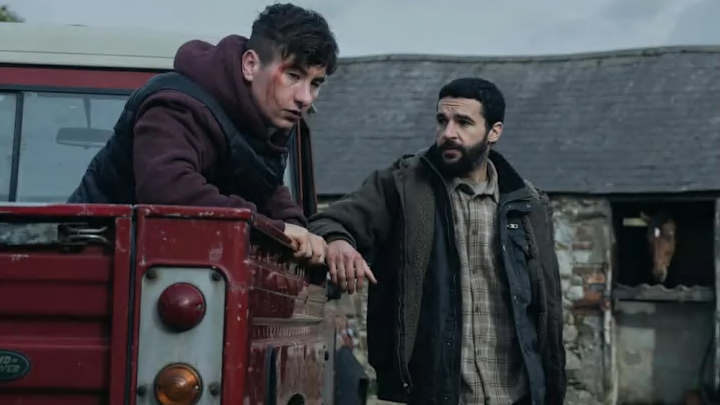Bring Them Down begins with death. Told through protagonist Michael O'Shea's (Christopher Abbott) eyes, we see the fateful day an infuriated Michael got into a severe car accident. Also in the automobile were his mother (who did not survive) and now ex-wife Caroline (Nora-Jane Noone). Death lingers in Michael’s mind. There’s a persisting haunting emptiness behind his pupils. It will not be the last time blood, mortality, and violence rear their ugly heads in Bring Them Down, a feature hailing from writer/director Christopher Andrews.
The proceedings then flash forward several years. Michael now lives in a shack in the Irish countryside with his elderly struggling father Ray (Colm Meaney). They share a hill with Caroline, her new husband Gary (Paul Ready), and his son Jack (Barry Keoghan). Both Michael and Gary make their days as shepherds. That's an already difficult task before the former character gets told by Jack that two of his rams died. This turns out to be a ruse, as this young man stole his livestock. So begins a feud between Michael and Gary’s family. What starts out as Gary banging his car into Michael’s fender takes increasingly gruesome turns. Traditional masculinity norms beckon folks like Michael and Jack to keep escalating things. Violence is the only answer, surely bloodshed will finally bring peace to these fractured lives.
Over the last two months, Christopher Abbott's stayed trapped in mainstream movies Kraven the Hunter and Wolf Man. The budgets were high on those titles (even the latter feature, which cost much more than a typical Blumhouse production), but the creative opportunities they provided Abbott were minimal. The talents he displayed so effortlessly in dramas like On the Count of Three or Possessor never had a chance to shine. Returning to more realistic ground with Bring Them Down, Abbott’s strengths have returned without missing a beat. The man’s gifts conveying lived-in pain just through his eyes are perfect when handling a profoundly tormented shepherd.
Abbott inhabits an odyssey of violently hostile neighbors in rural European backdrops that echoes one of 2023’s most underrated movies, The Beasts. A mesmerizing title from writer/director Rodrigo Sorogoyen, The Beasts chronicled a French couple carving out a living in the Galician backwoods. They were subsequently greeted with ceaseless xenophobic malevolence from their neighbors. Both Bring Them Down and The Beasts recognize how unnerving it is to set grim suspenseful sequences against backdrops ready for a postcard. Even in beautiful forests or hillsides, animosity between the working class persists. No domain is gorgeous enough to be exempt from people craving hierarchal power over others.
The Beasts is the superior of these two 2020s features thanks to (among other feats) its incredibly meticulous camerawork. However, Bring Them Down reminding me of such a standout feature exemplifies that Christopher Andrews and company did something right. Especially benefiting this project is Andrews dividing the story into two halves. Initially, Michael O’Shea is the focus of the proceedings. However, midway through Bring Them Down, audiences suddenly step back a few days to see Jack’s life. This approach accentuates a compelling tragic aura to the production.
Previously, Jack resonated as just a daddy’s boy twerp. Watching the world through his eyes, though, it’s clear he and Michael have more in common than not. Both men exist within toxic father/son relationships. Also, other men constantly tell them to keep their emotions in check. Ray chastises Michael for expressing any sort of vulnerability. Jack's "best friend", meanwhile, calls him a gay slur after briefly commenting on his sorrow over his parents separating. Michael and Jack view each other as enemies who can only resolve their problems with violence. The structure of Christopher Andrews Bring Them Down script, though, reaffirms that more binds than separates them. If only societal norms for men allowed them to realize that.
These ideas manifest through a visual scheme that’s less satisfying and idiosyncratic than the uniquely arranged script. Andrews and cinematographer Nick Cooke too often opt for more derivative camerawork approaches. Ceaseless shaky cam capturing Michael desperately chasing after a truck in the dead of night didn’t really heighten the character’s grief and confusion. It simply reminded me of countless other motion pictures (hi Paul Greengrass movies!) that employed similarly intentionally “incoherent” visuals. Briefly held medium shots also dilute some of the tension in intimate conversation scenes between confrontational characters.
More breathing room for the camera could’ve lent further personality and tangible discomfort to these sequences. Meanwhile, in terms of the writing, certain side characters like Ray and Caroline persistently remain more broadly defined figures in this two-hander between Abbott and Keoghan. Meaney and Noone are such compelling performers that I was constantly curious about seeing even more of their figures in this revenge parable!
Having enough room to deliver on their creative potential, though, is Hannah Peel’s ominous drum-heavy score for Bring Them Down. Her compositions* exude eerie sparseness. Drums often get played against minimal or no further instrumental accompaniment. This doesn’t just make for some strikingly unsettling sounds. It also provides a fitting auditory parallel to how isolated the two lead male characters are. Their worlds are so desolate that all they see is violence they’ve been conditioned to believe is an elixir solving anything. It’s a brutal world that makes for reasonably engaging thriller cinema in Bring Them Down.
*=On one larger industry-wide sidenote, Peel’s exceptional Bring Them Down score comes after initial musical pursuits that included scores for play and original EP's. She joins Trent Reznor & Atticus Ross, Jonny Greenwood, Daniel Pemberton, and Tamar-kali as exciting modern film composers who didn’t just start out scoring features. They came from other musical walks of life (bands, commercials & video games, stage work, etc.) and then transferred their skills into cinema. Keep finding composers from other music disciplines! Don’t just get another Hans Zimmer protégé, uncover an unexpected choice for a composer! There are other people beyond Lorne Balfe and Benjamin Wallfisch to score movies!
